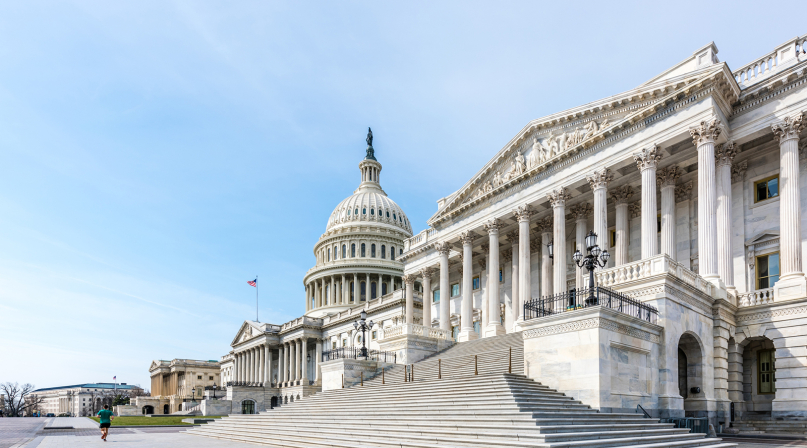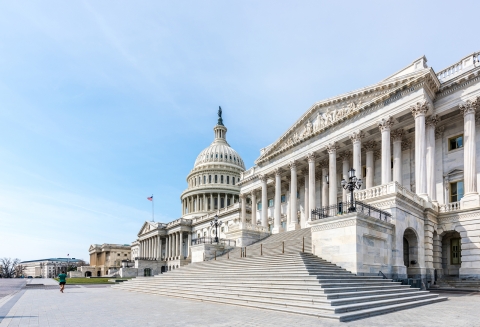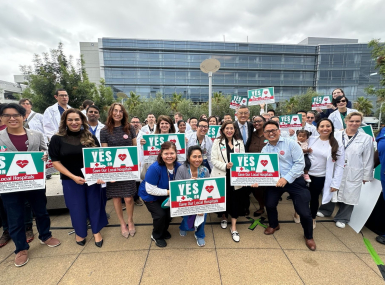County priorities in the next COVID-19 legislative package
Upcoming Events
Related News

Congress is working to reach a compromise on the massive, approximately $2 trillion economic package, aimed at addressing the complex impacts of the COVID-19 pandemic. Part of these negotiations includes potentially billions of dollars for a State Stabilization Fund. Counties are requesting that this fund is included in the package and counties have direct access to it in order to aid local response efforts for COVID-19.
While individual counties may opt against pursuing additional federal aid for COVID-19, NACo is fighting to ensure that America's county governments, parishes and boroughs are eligible for federal COVID-19 emergency aid in this legislation.
Counties also support the Municipal Bonds Emergency Relief Act, introduced by U.S. Sens. Bob Menendez (D-N.J.) and David Perdue (R-Ga.), and now a companion bill in the U.S. House. The $3.7 trillion municipal bond market is under severe distress. We need to act quickly to secure additional liquidity from the Federal Reserve and others for this important market for states and localities to finance our operations during the COVID-19 emergency.
State Stabilization Fund
The National Governors Association has requested at least $150 billion for state financial assistance:
- As part of any State Stabilization Fund or other general financial support, we also respectfully request that America’s counties be eligible for direct assistance from the U.S. Treasury.
- Our nation’s 3,069 counties employ approximately 3.6 million Americans (or more than one percent of the U.S. population).
- As major employers and service providers across the country, counties provide essential public health, public safety and overall essential safety net services.
- During this unprecedented pandemic, counties are also spending considerable financial resources to protect the health, safety and economic future of our local residents.
- All at the same time that our revenues are expected to take a dramatic hit, especially those counties dependent on local sales taxes and other special use taxes.
Municipal Bond Emergency Relief Act
Introduced by Sens. Menendez (D-N.J.) and Perdue (R-Ga.)
As outlined by our partners at the Government Finance Officers Association, our key messages and requests are:
- The $3.7 trillion municipal bond market is under severe distress. We need to act quickly to provide additional liquidity from the Federal Reserve and others for this important market for state and localities to finance our operations during the COVID-19 emergency.
- The market for state and local governments is currently broken, with retail investors selling off securities indiscriminately in a panic to convert assets into cash.
- As a result, municipal bond funds are facing massive outflows. Bond fund outflows of $12.2 billion are 3x the prior historical high.
- There are no buyers right now. Our market is predominately retail investors and otherwise has limited institutional buyers to serve as a backstop.
- Every day that goes by with halted market activity risks further degradation to investor confidence in the market.
- Investors face massive losses in the secondary markets, and issuers of all sizes face the risk of being shut out of the new issue market for an unknown period of time right when they need capital the most to continue their role in combatting COVID-19.
- There has been virtually no new issue market over the past 10 days.
- Furthermore, states and some local governments may need to issue tax anticipation notes (TANs) in the coming weeks to cover for the delay in income tax receipts as a result of IRS actions to delay filing deadlines.
- States will likely need to mirror IRS deadlines for a number of reasons, if their filing dates are not automatically tied to the federal date.
- Variable rate notes have spiked interest rate payments and risk further straining budgets at the most inopportune time for states and local governments as we gear up to help combat COVID-19.
- Tax exempt weekly floating rates for municipal bonds have soared to 7-10 percent. Fixed rate bonds are yielding 200-300 percent, rather than a fraction, of U.S. Treasury comparable maturities.
- States and local governments will need extra capital immediately to offset increased costs of the COVID-19 outbreak and declining revenues.
Paid Sick Leave Provision
Amend Provisions Covering 26 USC 3111
- The Second Stimulus bill (H.R. 6201), the Families First Coronavirus Response Act, which was signed into law on March 18, 2020, creates paid sick leave and family medical leave requirements for all state and local public agency employers.
- Unfortunately, the bill treats private companies and public employers very differently.
- Both are required to provide paid sick leave, but only private sector employers will receive a tax credit to offset the costs.
- Public sector employers are explicitly prohibited from receiving these same tax credits, even though the vast majority of local governments (and special purpose districts) pay these same federal payroll taxes (i.e. Social Security and Medicare).
- Urge Congress to treat state and local governments the same as private employers by allowing those counties who would normally qualify for the payroll credits for the new requirements under the new paid sick leave and paid family leave provisions.

Attachments
Related News

CMS issues new guidance on Medicaid Community Engagement Requirements
On December 8, the Centers for Medicare & Medicaid Services (CMS) released a Medicaid and CHIP Services Informational Bulletin (CIB) directing states on how to implement the Medicaid community engagement requirements enacted under Section 71119 of the One Big Beautiful Bill Act legislation (Public Law 119-21), or H.R. 1.

California county sales tax measure backfills federal healthcare cuts
Santa Clara County, Calif. will raise an estimated $330 million each year from a sales tax to backfill lose Medicaid funding.
